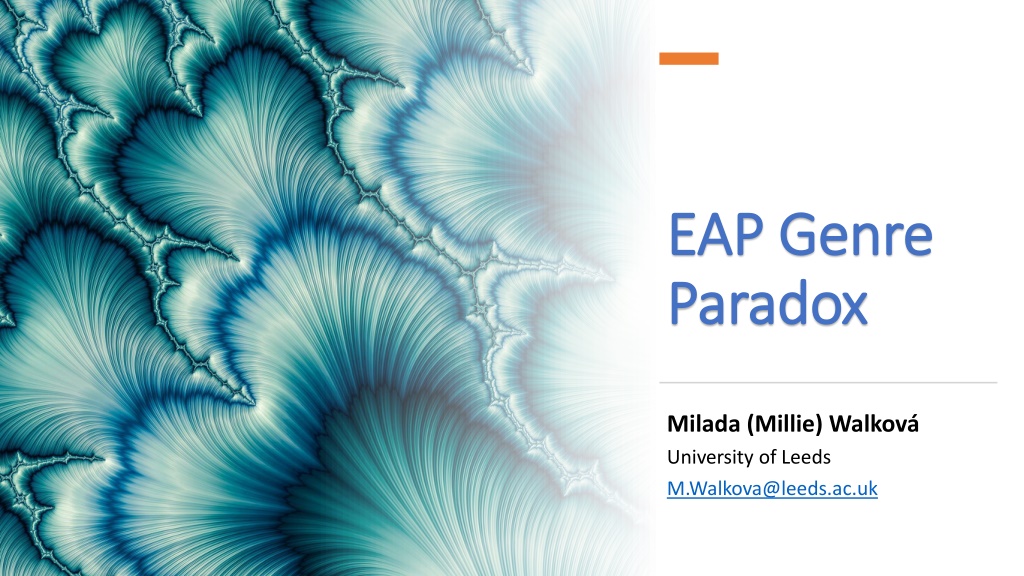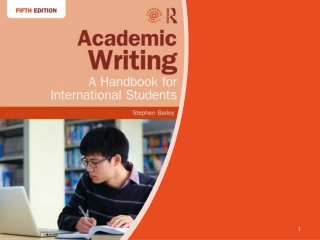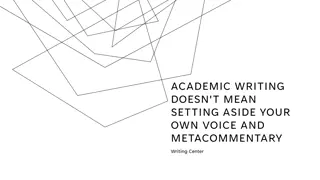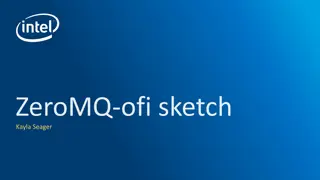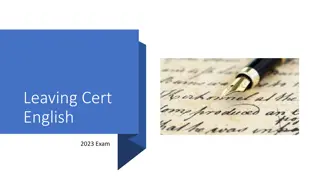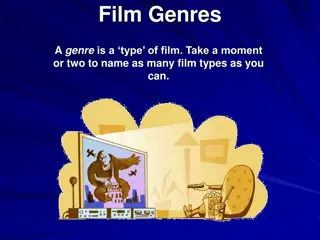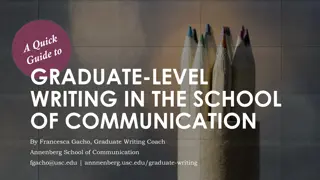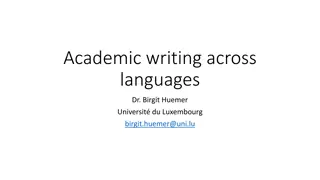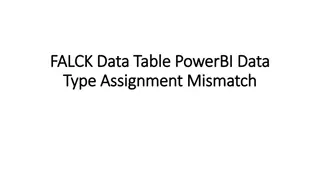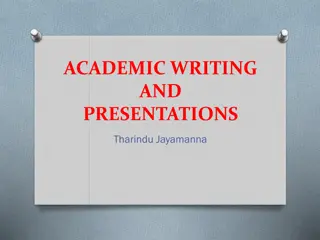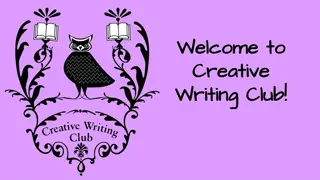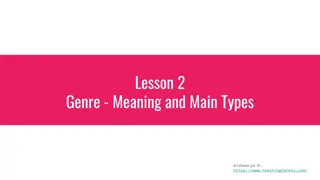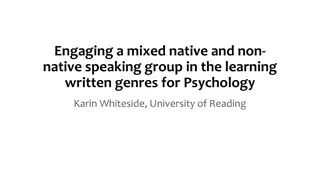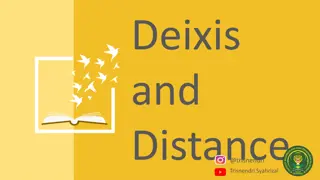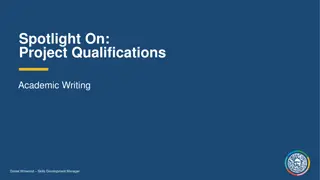Understanding Social and Discoursal Mismatches in Academic Writing Genres
Exploring the challenges of social and discoursal mismatches in academic writing genres, this content delves into issues of pedagogy, audience perceptions, purposes of writing, and structural/language differences between student and expert genres. It highlights the complexities students face in navigating diverse academic literacies and practices, urging a reevaluation of dominant pedagogical approaches to enhance genre awareness and alignment.
Download Presentation

Please find below an Image/Link to download the presentation.
The content on the website is provided AS IS for your information and personal use only. It may not be sold, licensed, or shared on other websites without obtaining consent from the author. Download presentation by click this link. If you encounter any issues during the download, it is possible that the publisher has removed the file from their server.
E N D
Presentation Transcript
EAP EAP Genre Genre Paradox Paradox Milada (Millie) Walkov University of Leeds M.Walkova@leeds.ac.uk
Genre pedagogy: issues Genre pedagogy: issues Socialisation > classroom instruction rhetorical approaches (cf. Bawarshi & Reiff 2010) Danger of prescriptive pedagogy (cf. Hyland 2007) Multiple academic literacies, practices not visible, a call to challenge dominant practices Academic Literacies (e.g. Lea & Street 1998)
EAP genre paradox EAP genre paradox Genres students read (textbook, journal article) Genres students produce (essay, lab report, dissertation) Social and discoursal mismatches between student and expert genres
Social mismatches: Audience Social mismatches: Audience Student genres A more knowledgeable and powerful reader Expert genres Less knowledgeable reader Peers Shaw (1992: 304): textbooks inform downwards from a position of authority, and articles report horizontally to peers, while writers of theses are required to display their knowledge and grasp of the subject culture to superiors
Social mismatches: Purpose Social mismatches: Purpose Student genres Display knowledge and demonstrate skills Expert genres Inform Disseminate knowledge Hyland (2012: 141): students have to to demonstrate an appropriate degree of rhetorical sophistication while recognizing readers greater knowledge of the field and power to evaluate their text
Discoursal mismatches: Structure and language Discoursal mismatches: Structure and language Student genres Structure and language often prescribed Simplistic rules in writing guides Teachers believing students must follow the rules before breaking them Language imitated from expert genres might not be appropriate Expert genres Structure and language chosen to match the purposes
Example: Topic sentences Example: Topic sentences So while impersonality may often be institutionally sanctified, it is constantly transgressed. This is generally because the choices which realise explicit writer presence also contribute to a high degree of ego-involvement (Chafe, 1985), and are closely associated with authorial identity and authority. All writing carries information about the writer, and the conventions of personal projection, particularly the use of first person pronouns, are powerful means for self-representation (Ivanic, 1998, Ivanic and Simpson, 1992). Authority, as I noted above, is partly accomplished by speaking as an insider, using the codes and the identity of a community member (e.g.Bartholomae, 1986, p. 156). But it also relates to the writer s convictions, engagement with the reader, and personal presentation of self .Cherry (1988)uses the traditional rhetorical concepts ofethos and personato represent persuasiveness as a balance between these two dimensions of authority: the credibility gained from representing oneself as a competent member of the discipline, and from rhetorically displaying the personal qualities of a reliable, trustworthy person. (Hyland 2001: 209)
Games academics play Games academics play Student told Who are you to write like that [with authority] ? Subject tutor expecting students to spell out purpose in their writing Students using phrase This paper is purposefully brief
Is the Is the EAP genre paradox EAP genre paradox a problem? a problem? Knowledge shared with the reader content not developed in depth (Parkinson 2017), or sources not cited impact on academic integrity (Chandrasoma et al. 2004; Parkinson 2017) When writing for an audience they know personally, novice student writers tend to use spoken register (Puma 1986, cited in Aull 2015) Writing to display knowledge means less risk-taking in terms of composition (Wong 2005) Students uncomfortable assuming authority (Hyland 2002) and expressing criticality (Jomaa & Bidin 2017) in their writing
Implications for research and scholarship Implications for research and scholarship Research should not compare student and expert genres without considering discoursal differences E.g. Chen (2006): frequency of linking words in student writing (MA dissertation) v. expert writing (journal article) disregarding genre differences in terms of length and information density
Implications for teaching Implications for teaching 1. Acknowledge the paradox acknowledge multiple and conflicting purposes, audiences, occasions of student writing rather than a single purpose and a single audience (Coe 2002: 203) 2. Clarify the intended audience the intended audience should be clarified and explained to students as part of writing task instructions (Wong 2005: 44) 3. Empower students to follow or flout conventions to achieve their purpose Understanding the rationale for conventions and possible effects of following or flouting them Critical Pragmatic EAP (Harwood & Hadley 2004)
Provide students with student exemplars? Provide students with student exemplars? Merely accentuates the EAP genre paradox Genre analysis (Swalesian, SFL) requires access to exemplars for analysis Students have limited access to student genres Reading a text for content before analysis (Thornbury 2005) Schema theory: Frequent exposure to a genre leads to the development of formal schemata (Carrell 1987)
Mismatch in purpose for reading and knowledge Mismatch in purpose for reading and knowledge Student genres Limited access Not read for content Formal schemata need to be developed Expert genres Read by students frequently Read for content Students probably have formal schemata
Summing up Summing up Student and expert genres differ in multiple ways (purpose, audience, structure, language) Implications for the acquisition of academic writing (content, criticality, academic integrity, appropriate use of language) The problem cannot be avoided raise awareness of students and teachers
References References Aull, L. 2015. Linguistic attention in rhetorical genre studies and first year writing. Composition Forum 31:n.p. Bawarshi, A.S. & Reiff, M.J. 2010. Genre: An introduction to history, theory, research, and pedagogy. West Lafayette: Parlor Press. Carrell, P.L. 1987. Content and formal schemata in ESL Reading. TESOL Quarterly 21(3):461 481. Chandrasoma, R., Thompson, C. & Pennycook, A. 2004. Beyond plagiarism: Transgressive and nontransgressive intertextuality. Journal of Language, Identity, and Education 3(3):171-193. Chen, C.W.Y. 2006. The use of conjunctive adverbials in the academic papers of advanced Taiwanese EFL learners. International Journal of Corpus Linguistics 11(1):113-130. Coe, R.M. 2002. The New Rhetoric of genre: Writing political briefs. In A.M. Johns (ed), Genre in the classroom: Multiple perspectives, 197 207, Mahwah: Erlbaum. Harwood, N. and Hadley, G. 2004. Demystifying institutional practices: Critical pragmatism and the teaching of academic writing. English for Specific Purposes 23(4):355-377. Hyland, K. 2001. Humble servants of the discipline? Self-mention in research articles. English for Specific Purposes 20(3):207-226. Hyland, K. 2002. Authority and invisibility: Authorial identity in academic writing. Journal of Pragmatics 34(8):1091-1112. Hyland, K. 2007. Genre pedagogy: Language, literacy and L2 writing instruction. Journal of Second Language Writing 16(3):148-164. Hyland, K. 2012. Undergraduate understandings: Stance and voice in final year reports. In K. Hyland and C.S. Guinda (eds), Stance and voice in written academic genres, 134 150, London: Palgrave Macmillan. Jomaa, N.J. & Bidin, S.J. 2017. Perspectives of EFL doctoral students on challenges of citations in academic writing. Malaysian Journal of Learning and Instruction 14(2):177-209. Lea, M.R. & Street. B.V. 1998. Student writing in higher education: An Academic Literacies approach. Studies in Higher Education 23(2):157 172. Parkinson, J. 2017. The student laboratory report genre: A genre analysis. English for Specific Purposes 45: 1 13. Shaw, P. 1992. Reasons for the correlation of voice, tense, and sentence function in reporting verbs. Applied Linguistics 13(3):302-319. Thornbury, S. 2005. Beyond the sentence: Introducing discourse analysis. Oxford: Macmillan. Wong, A.T. 2005. Writers mental representations of the intended audience and of the rhetorical purpose for writing and the strategies that they employed when they composed. System 33(1):29 47.
